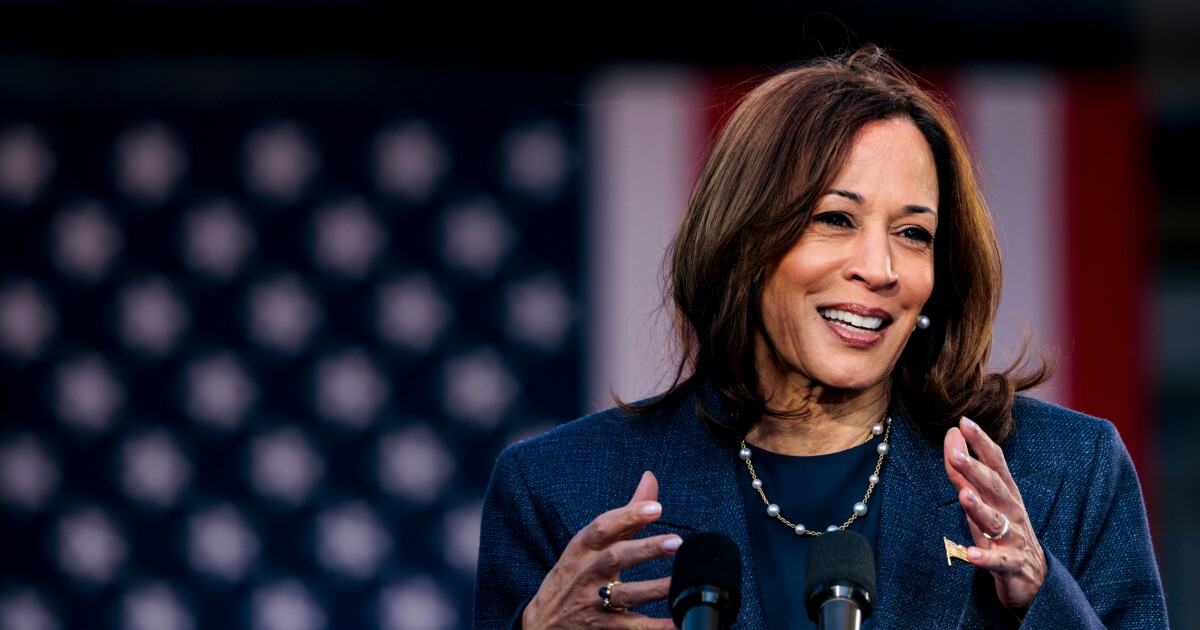Accounting
Harris goes quiet on Biden’s push to tax unrealized gains
Published
7 months agoon

Vice President Kamala Harris has gone silent on Democrats’ bid to tax unrealized investment gains — casting doubt on how strongly she’d push for a key plank of the party’s efforts to raise taxes on billionaires.
Harris, who has already pledged to scale back one of President Joe Biden’s key policies on capital gains taxation, is declining to give specifics about her support for other pillars of the administration’s vision to raise taxes on businesses and the wealthy. That includes a White House plan to tax unrealized gains, a major proposed Internal Revenue Code change designed to increase levies on the richest Americans who are often able to avoid taxes under the current rules.
The Democratic nominee still supports a billionaire minimum tax, a campaign official said in a brief statement, speaking on condition of anonymity. Her team declined to provide specifics about that proposal or comment directly on how unrealized gains would be treated.

Hannah Beier/Photographer: Hannah Beier/Bloom
Harris’ campaign also declined to say if she supports the specific parameters of the minimum tax on billionaires included in Biden’s annual budget request to Congress, which — despite the name — would apply a 25% minimum levy to income of those with at least $100 million in assets. Her campaign has been mum about whether she would seek to change a provision in the tax code that allows many wealthy individuals to avoid capital gains taxes entirely when they pass assets onto their heirs.
The move to tax unrealized gains was one of the more polarizing features of Biden’s budget proposal — critics saw it as murky to enforce and a disincentive for growth, while advocates cheered it as an innovative way to tax the rich more.
Harris’ silence comes as she’s bolstered her pro-business rhetoric and tacked her policy agenda to the middle to woo Republican and independent voters with polls showing her deadlocked against Republican rival Donald Trump. She described herself as a “pragmatic capitalist” in an interview with Telemundo Tuesday, saying she is part of a new generation of leadership that “actively works with the private sector to build up the new industries of America.”
Days after Harris replaced Biden as the Democratic presidential nominee in late July, her campaign said she supports the revenue measures in the president’s budget request, though she’s since broken with him on the scope of a capital gains tax increase, calling for a top rate hike from 20% to 28%, instead of the 39.6% that Biden has embraced.
Capital gains taxes are generally paid when an asset is sold, which means that people who hold an asset that has appreciated considerably don’t immediately pay taxes on the increase. In some cases, the wealthy simply borrow money against the gains rather than having to sell.
Some of the richest people owe relatively few taxes in comparison to their overall wealth because they hold onto their assets indefinitely, vastly growing their personal fortunes through unrealized gains, but rarely recording any income on paper, which would trigger an IRS bill.
The ambiguity on unrealized gains could be strategic — by avoiding taking a position, Harris is able to give herself room to negotiate in the future on a portion of her tax agenda that is closely scrutinized by Wall Street and Silicon Valley.
Billionaire investor Mark Cuban, a Harris ally, predicted over the weekend that a tax on unrealized gains would not be enacted. “That’s an economy killer. Kamala knows that,” Cuban said at an event Saturday in Arizona, according to NBC. “You haven’t heard her talk about it.”
The debate is, in some ways, theoretical, with polls showing Republicans on track to take control of the Senate even if Harris wins the presidency. A divided government dims her hopes of passing the fresh taxes she’s seeking, and may pressure her to avoid digging in on proposals with slim chances of success.
Harris is grappling with how strongly to break from Biden in the race against Trump, where his campaign has said a tax on unrealized gains would “kill 75,000 jobs, reduce investment incentives, hurt long-term economic growth, and target family farms and family-owned small businesses the most.” Trump, for his part, has campaigned on a long list of politically-targeted tax breaks, which economists have warned would add trillions to the national debt.
The Biden budget, which has proposed including unrealized gains when calculating income for the 25% billionaire minimum tax, has also raised concerns from tax professionals.
The plan “would be a departure from the way we’re treating capital gains under current law and how we treat it historically,” Garrett Watson, a senior policy analyst at the right-leaning Tax Foundation, said in an interview. “We’re generally more skeptical of this kind of approach.”
Harris has also campaigned on a slew of other tax measures, including higher corporate tax rates, an expanded child tax credit and expanded deductions for startup businesses.
You may like
Accounting
What the House gave the Senate: Inside the Big Beautiful tax bill
Published
1 hour agoon
June 3, 2025
The reconciliation bill passed by the House on May 22 is currently being considered by the Senate, and will likely undergo changes before approval by the upper chamber. To what extent the changes will create stumbling blocks before a final bill is produced and voted on is uncertain, with the increased SALT deduction, Medicaid reforms, and repeal of certain Inflation Reduction Act credits on the line.
While much can change between now and the final version of the bill, the following is a quick overview of some of the provisions:
- Bonus depreciation. First-year bonus depreciation, currently being phased down 20% per year since 2023, is 40% for 2025, and will drop to 0% in 2027. Under the One Big Beautiful Bill Act (or OBBBA) it will be reset at 100% for eligible property acquired and placed in service after Jan. 19, 2025, and before Jan. 1, 2030.
- Section 199A Qualified Business Income deduction. The QBI deduction, created by the Tax Cuts and Jobs Act, is available through 2025 to owners of pass-through entities, sole proprietors and the self-employed. The OBBBA would make the deduction permanent, and the deduction would increase to 23% for tax years beginning after 2025.
- Domestic research and experimental expenditures. The OBBBA would reinstate the deduction available to businesses that conduct research and experimentation. Expenses incurred after 2024 and before 2030 would be eligible.
- Section 179 expensing. The bill increases the limit to $2.5 million and increases the phaseout threshold to $4 million for property placed in service after 2024. The limit and threshold would be adjusted annually for inflation.
- Excess business loss limitation. The bill makes permanent the excess business loss limitation for pass-through entities.
- Pease limitation. The bill would make permanent the repeal of the Pease limitation on itemized deduction, but would introduce a new limitation for taxpayers in the 37% bracket for years after 2025. It would also temporarily increase the standard deduction for tax years 2025 through 2028.
- The Child Tax Credit. The bill makes the CTC permanent and raises it to $2,5000 per child for tax years 2025 through 2028, after which it would return to its present $2,000 with an annual inflation adjustment.
- Federal gift and estate tax exemption. The bill increases the federal gift and estate tax exemption to $15 million, and adjusts it annually for inflation. It is currently set at $13.99 million.
One sector the bill is very positive for is real estate, according to Tyler Davis, president of Saunders Real Estate: “It makes a lot of the TCJA provisions permanent. The estate tax exemption is made permanent and raised to $15 million, and the bonus is back to 100% for the next four years. This allows purchasers to depreciate their investments a lot faster, so it makes deals more attractive for investors and developers. A special provision for industrial manufacturing property under the bill, it is eligible for 100% expensing.”

Photographer: Nikita Sobolkov/nikkytok – stock.adobe.com
This would allow 100% of a project’s cost to be deducted in the first year, making it “hugely attractive,” he said. “The administration wants to bring investment back to the U.S. This will incentivize that process.”
Under the bill, the Section 163(j) business interest deduction would expand and allow more interest to be deducted on qualifying real estate, he said. “And they’re redoing some of the Opportunity Zone rules and boundaries, and are lowering reinvestment thresholds for investments. This should drive more investment into rural communities. And, lastly, there are no Section 1031 changes in the bill. That’s a really positive thing from a transactions and reinvestment perspective.”

Top 25 Firm WithumSmith+Brown acquired Pannel Kerr Forster of Texas on June 1, expanding its geographic reach into Texas and adding energy and oilfield expertise to its practice.
PKF Texas is an accounting, tax and business advisory firm headquartered in Houston. Its 20 partners and approximately 160 team members will join Withum’s roster but remain at their Houston office.
“Joining forces with Withum offers our valued clients and dedicated staff even greater opportunities to thrive and succeed,” Gary Voth, director and chairman of the board at PKF Texas, said in a

PKF Texas also strengthens Withum’s financial services, manufacturing, professional services, technology, private client services, client accounting and advisory services.
‘Uniting our firms enables us to grow a portfolio of energy and oilfield service businesses nationwide,” Patrick Walsh, Withum’s managing partner and CEO, said in a statement. “A piece of our M&A strategy aims to build around existing capabilities to create a more holistic client service approach. Diversity in expertise, experience and culture strengthens our ability to serve our clients and attract talent. Having a presence in the Space City offers us fantastic growth opportunities, and we’re excited to be here.”
Withum is based in Princeton, New Jersey, and reported $577 million in revenue in 2024. It has 25 offices, 226 partners and over 2,300 employees.
In April, Withum added


Few puzzles are more complex that running a wealth management practice, which combines all the usual challenges of an accounting firm — from staff shortages and succession issues to the introduction of disruptive technologies like artificial intelligence — with volatile markets, skittish clients whose expectations change at the drop of a hat, an uncertain regulatory environment and an ever-fluctuating economy, and a constant flow of new and confusing investment options.
What’s more, it’s a puzzle that even CPA financial planners as successful as this year’s Wealth Magnets can never hope to fully solve, since the factors impacting it are always changing — as is the practice area itself.
“I’ve had a front-row seat to the rapid evolution of wealth management, and it’s clear we’re at a critical crossroads,” explained Matthew Delaney, managing partner of his eponymous firm in Santa Rosa, California. “One of the biggest challenges we face today is meeting the rising expectations of a new generation of investors … [who] want transparency, accessibility, and personalized guidance that fits seamlessly into their digital lifestyles. At the same time, increasing regulatory complexity and the ever-present threat of cybersecurity breaches add new layers of difficulty for firms trying to stay agile and responsive.”
(See this year’s ranking of the Top Firms by AUM here.)
Making the puzzle even more complicated is that it needs to be constantly worked out over time, handling the immediate crush of work while also laying the groundwork for the future.
“We’re focused on balancing long-term goals with daily responsibilities,” said John Valleau, president of Skokie, Illinois-based ShankerValleau Wealth Advisors. “When clients need us, they come first. But it’s easy to lose sight of the bigger picture amid day-to-day demands. To stay aligned, we now hold weekly team meetings to share ideas, discuss trends, and review our goals.”
And all that has to be managed while firms themselves are changing, metamorphosizing as a result of their own success.
A good problem to have
In fact, the most common challenge that 2025’s Wealth Magnets are puzzling over is how to handle being so good at what they do.
This year, the 150 top CPA financial planners in the country reported $311 billion in assets under management, up from last year’s $295 billion, and 60 reported more than $1 billion in AUM, up from 53 in 2024.
Put simply, many of them are expanding rapidly, and that can strain an accounting firm in multiple ways.
At Steel Tower Investments in Pittsburgh, “Our greatest challenge is managing growth effectively,” according to its president, Elizabeth Urish. “As we continue to scale, we remain focused on delivering meaningful value to our clients by strategically adding key talent and enhancing our infrastructure and processes. Staying disciplined and focused on the fundamentals is essential to sustaining long-term success.”
Maintaining a personal touch as a practice grows is a concern for many of this year’s Wealth Magnets, including Braintree, Massachusetts-based Napier Financial.
“One of the biggest challenges we’re currently facing is scaling and growing the practice while maintaining the same high level of personalized client service,” said business operations manager Prescott Busk. “As we expand, managing bandwidth effectively becomes critical. To address this, we’re streamlining internal processes, leveraging technology for greater efficiency, and being strategic about team growth to ensure we continue elevating the quality of service our clients receive.”
It’s rare that expansion only strains one aspect of a firm; usually it brings pressure in multiple areas.
“Our firm is experiencing extreme growth, which is both exciting and demanding,” explained Trevor Hodges, chief operating officer of Parsippany, New Jersey-based Sax Wealth Advisors. “With that comes the need to scale everything: systems, processes, communication, and most importantly, our people. Scaling the business intelligently is a top focus. We’re investing heavily in infrastructure-tech, workflows, and operational support, to make sure the client experience remains seamless as we grow. We’re also being intentional about who we hire, making sure every addition to the team adds both talent and cultural alignment. … In short, we’re growing fast in a volatile environment, so staying client-centered, people-focused, and process-driven is what’s keeping us on track.”
“The biggest issue our wealth management practice is currently facing is finding internal efficiencies to better serve our clients,” added Steve Neher, managing member of Wenatchee, Washington-based Cordell, Neher & Co. “As our practice continues to grow, we recognize the importance of sustaining our service quality and adapting to evolving demands. By leveraging technology, we strive to streamline daily tasks for our staff, allowing them to focus on meaningful client interactions and provide personalized solutions where they are most needed.”
The strain of rapid growth is felt not just with high-level concerns like quality control and maintaining strong client relationships; growth also means more daily tasks for everyone in the firm.
At Frisco, Texas-based Cain Watters & Associates, for instance, “Managing growth is an ongoing issue, especially with the numerous investment operational tasks like requests to open new accounts, move money, and perform other investment operations tasks,” said chief marketing officer Erin Jeffries. “To handle these issues, we are expanding our investment operations team and looking for a more efficient process.”
Efficiency is available to everyone, and in multiple ways; finding extra staff, on the other hand, is as much a problem for the Wealth Magnets as managing their growth.
The people problem
Staff shortages are plaguing every part of the accounting profession, of course, and CPA financial planners are feeling the pain as much as anyone.
“Acquiring talent and quality advisors to execute the business model of building high-performing teams inside our accounting firm office locations” is a major challenge for Dallas-based Level Four Advisory Services, according to chief executive officer Edmon “Jake” Tomes. “We are investing in a recruiting and sales team to identify and secure talent from banks, wirehouses and regional brokerage firms, while executing an aggressive strategy for RIA acquisitions.”
The solutions vary from firm to firm, from higher compensation and extra bonuses, to hiring more nonaccountants or taking advantage of opportunities in technology or outsourcing. Among those who are focusing on hiring, some are taking a long-term approach to talent attraction and retention, like Minneapolis’ Boulay.
“We have to stay focused on creating paths to ownership for our best people,” explained its president, Jay Brown. “We are committed to staying independently owned and operated — and we believe that will be a key differentiator for talent.”
That kind of long-term thinking can also uncover some long-term problems.
“We are good at developing staff into advisors, but the next hurdle is developing the next generation into people that can generate new business,” said Joe Pitzl, managing partner of St. Paul, Minnesota-based Pitzl Financial. “Our founding partners have grown organically from scratch to where we are today. The next wave of growth falls onto the next generation of the firm.”
At CRA Financial in Northfield, New Jersey, co-managing member Matthew Reynolds also noted the challenge of succession planning.
“Although it is more than a decade out, monetization for the founders is an issue because valuations make anything close to market value almost impossible for an internal transfer,” he said. “We’re still searching for a viable solution.”
Finding the talent — whether to handle immediate work or to shore up the long-term viability of the firm — is only the first step; making sure they’re up to the work is a perennial problem.
“One of the biggest challenges we are currently navigating is ensuring consistent training across our team, especially as we grow and onboard new talent,” said Ryan McEntire, a director and chief compliance officer with Brown Edwards Wealth Strategies in Lynchburg, Virginia. “With the evolving complexity of financial planning and increasing client expectations, it is critical that our advisors and support staff are not only technically proficient but also aligned in how we deliver value and service.”
“To address this,” he continued, “we are building a more structured internal training program that includes ongoing education, case study reviews, and mentorship. We also launched an internship program designed to create a pipeline of future talent. This initiative allows us to train individuals early in their careers, expose them to real-world client work, and assess their cultural fit before moving them into full-time roles. The combination of formalized training and the internship program is helping us ensure we are equipped to meet client needs.”
Problems and solutions
Challenges involving technology have the greatest potential upside for CPA financial planners: If they can solve the puzzles that come with new tech tools — from cybersecurity and data privacy issues to simply keeping up with the flood of new solutions — they stand to revolutionize their practices.
“The adoption of emerging technologies in wealth management has the potential to reshape our industry, and with it comes challenges and opportunities both internally and externally,” said Laurie Peer, president of RKL Wealth Management in Lancaster, Pennsylvania. “From the responsibility to safeguard sensitive information to helping our clients navigate the use of digital tools with confidence, nearly every aspect of our work involves a degree of change management and technology adoption that’s redefining the way we work.”
“We’re invested in fostering a culture of innovation, encouraging exploration of new technologies, and actively seeking feedback to refine our strategies,” she continued. “Through strategic investments and client-centric solutions, RKL Private Wealth is well-positioned to deliver an enhanced client experience that leverages the efficiencies of technology while capitalizing on our true differentiator — personal connection and alignment around our clients’ most significant aspirations.”
Of course, no discussion of technology can avoid touching on artificial intelligence, which is still in its early days, but is taking up a lot of mindspace in the profession.
“As the development, availability and accessibility of AI-based applications has increased, we’ve had to evaluate the use case for said applications and devote time and resources to broadscale testing and deployment through to our end clients,” said John Lesser, group managing partner of Southfield, Michigan-based Plante Moran Financial Advisors. “While many of these applications can and will allow us to be more efficient as advisors, they also present unique challenges to a client-centric business, as ours is. First and foremost, we need to ensure we are doing everything we can to maintain client confidentiality and not expose our clients to unnecessary cybersecurity risks or data breaches. Second, we don’t want to lose our personal touch or have automation take away from our interpersonal relationships with our clients.”
The eternal puzzle
Of all the riddles CPA financial planners face, the one that truly can never be solved lies at the intersection of the volatility of markets and the economy, and the hopes and fears of clients.
Bryon Gragg, senior partner at Shelby, North Carolina-based Gragg Financial, shared a concern that keeps all of his fellow Wealth Magnets up at night, year in and year out: “Keeping clients focused on their long-term plan rather than current market conditions. We spend a lot of time educating clients upfront of the nature of investing; there are times that can be uncomfortable but it’s the price to get the long-term results.”
Sax Wealth Advisors’ Hodges echoed that: “One of the biggest challenges we’re facing right now is managing through market uncertainty while continuing to grow at an aggressive pace. Clients are understandably anxious, and staying ahead of their questions, while continuing to provide clarity and confidence, is a constant priority.”
This year, uncertainty in Washington, D.C., is playing a larger role than usual in challenging wealth managers, both in terms of client concerns and the tax and regulatory environment. This is making it harder to keep clients on track, and to help them manage change.
“The current political climate has resulted in some clients being very anxious about the market and others very optimistic,” said Kellie Masters, director of operations and chief compliance officer of Wealth Advisors of Iowa, in West Des Moines. “We try to temper expectations on both sides and are encouraging clients to stick to their long-term plans.”
“Our advisors have to balance investment advice with tax planning and tax filing deadlines,” added Morgan Tesoriero, chief compliance officer of Joel Isaacson & Co. in New York City. “With the current administration and the uncertainty in the market surrounding policy decisions, it was especially time-consuming and challenging to balance the tax work and client fears about the economy/market.”
Putting the pieces together
With so many pieces to keep track of, the puzzle of running a wealth management practice can seem insoluble — and as we’ve noted, in some ways it is; there are permanent challenges involved in helping clients achieve their financial goals (often coming from the clients themselves!).
But the search for solutions itself can yield benefits, according to California’s Delaney: “The good news? These challenges present real opportunities for innovation and growth. At our firm, we’re embracing technology not just to keep up, but to lead. … But technology alone isn’t enough — it’s the human insight behind it that makes the difference. That’s why we’re committed to a hybrid advisory model that blends digital efficiency with the deep, trusted relationships our clients value. The path ahead won’t be without its hurdles, but with the right strategy, we can turn today’s challenges into tomorrow’s strengths.”

What the House gave the Senate: Inside the Big Beautiful tax bill

Job openings showed surprising increase to 7.4 million in April

Withum acquires PKF Texas | Accounting Today

New 2023 K-1 instructions stir the CAMT pot for partnerships and corporations

The Essential Practice of Bank and Credit Card Statement Reconciliation

Are American progressives making themselves sad?
Trending
-

 Blog Post1 week ago
Blog Post1 week agoHow to Implement Internal Controls to Prevent Business Fraud
-

 Economics6 days ago
Economics6 days agoElon Musk says Trump’s spending bill undermines the work DOGE has been doing
-

 Economics1 week ago
Economics1 week agoMAGA: protecting the homeland from Canadian bookworms
-

 Personal Finance6 days ago
Personal Finance6 days agoHarvard, Trump international enrollment battle affects college applicants
-

 Accounting6 days ago
Accounting6 days agoHighest paid jobs in corporate accounting
-

 Personal Finance1 week ago
Personal Finance1 week agoHow to pay college tuition bills with your 529 plan
-

 Economics7 days ago
Economics7 days agoHow young voters helped to put Trump in the White House
-

 Finance6 days ago
Finance6 days agoGameStop shares rise as retailer meme stock buys first bitcoin batch, scooping up $500 million
